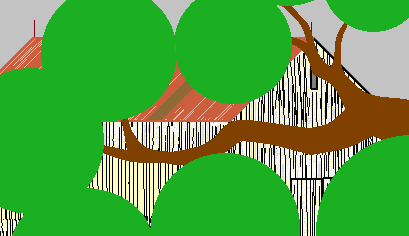Spadina Literary Review — edition 20 page 23
memoir

The Heights
by Chris Ingram
My stepmother was a bully. One wrong step on my part could launch a day’s worth of abuse. The details need not be described here. It's sufficient to say that when she was at her worst her only goal was to make sure I felt as small and meaningless as she must have felt, somewhere deep down, about herself. So, at five years old, I did what I had learned to do to keep myself safe: I would head for my sanctuary in our heavily wooded North Shore hamlet. I headed for the trees.
I guess you could say I grew up in those trees. The view from fifty feet up or more provided a safe, solitary perspective that gave me some sense of control over my life. After all, no one was crazy enough to follow me up into the highest, willowy branches where the wind whisked me to and fro. Even my closest friends eschewed the risk of following me more than two-thirds of the way up to my perch. It hadn't occurred to me that I might be trying to kill myself, until my stepmother belted that suggestion upward at me one time. Even then, it didn't ring true. Of course, it may have helped that her distance and the intervening branches seemed to strip the urgency from her raging voice. It was as if she were howling at the moon, while I sat tucked in some lunar mare safe from the threatening edge of her voice.
I was proud of my pastime, and jealous of those who might encroach upon my territory. My tree-conquering ways propelled me to new heights, where common sense and self-preservation would turn back any pretenders — they would look up, shake their heads, then pick their way back down to safer altitudes, allowing as how they didn't see what the big deal was about risking your neck anyway. I never excelled at their games — I couldn't throw a ball straight, or catch one. This arboreal world was mine alone.
Until I met Donald.
He was a round-headed blond wisp of a kid when we met in first grade. (I would describe myself to you but I never had a real sense of what I looked like. Uncombed, maybe; forlorn.) Donald came from a family of nine. His family filled an old farmhouse to bursting. Each kid's name started with the letter "D". There was Dana, David, Donald, etc. His mother had the exasperated look of an overworked farmer's wife who’s been out in the sun too long, and while I didn't know what his father did for a living, I knew he was feared. I recognized the tension that filled the house when he entered as the same dread that accompanied my stepmother at my house.
I guess that's why Donald and I became such fast friends: we were both being mistreated, and, I suppose, we sought out the non-threatening company of the threatened. Retreating, leprous, we never talked about our treatment at the hands of our abusers, or even who they were. That was all taken for granted.